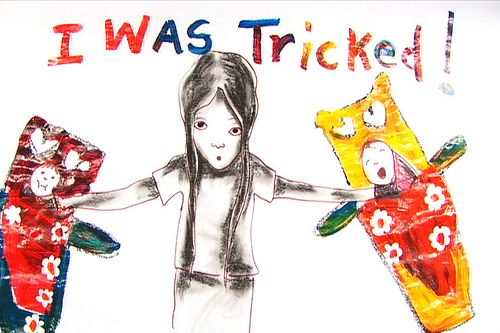A trip to the optometrist can be inspiring for Cecilia Araneda, the executive director of VUCAVU, a newly launched online portal featuring 45 years of independent video and film from Canadian artists.
“My optometrist will say to me ‘I saw this film at the Cinematheque but where can I find more like it?’ And I realize these films have a bigger fan base than I think!,” Araneda told rabble.ca in an interview.
VUCAVU is the brainchild of a group of independent video and film distributors from across Canada, concerned by the tidal wave of digitization and social media that has served to push lesser-known artists to the edges of distribution.
“With digital right now it’s as if we are reverting back to the ’80s — I’m thinking of music where there is a focus on mega stars, and that is who is being marketed,” noted Araneda. “The idea of the internet was that everything would be made visible but instead, a lot is invisible — it’s like trying to find a needle in a haystack.”
At the moment, VUCAVU has about 5,000 videos digitized with a total of 14,000 to be completed by mid-2018. They include such venerable artists as Michael Snow and Guy Maddin.
The kernel for the idea was sparked by an early 2000s Canada Council report concerning distribution models. Since then, various distribution agencies such as the Canadian Filmmakers Distribution Centre in Toronto, the Winnipeg Film Group, Video Pool in Montreal and a few others have tried to launch the portal.
In 2013, they got a $1.5-million startup grant to get it going. By late 2018, Araneda expects VUCAVU to be launched fully along with a more public campaign.
Netflix as a model
“The idea is along the model of Netflix,” said Araneda. “Most people want to stream, downloading is dead.”
VUCAVU is primarily for curators around the world interested in programming Canadian videos and films and these users, who have to present their credentials, would be provided free access.
On another level is the public. So, VUCAVU would allow someone to pay $1 to $5 (access and prices are set by the artist) to screen a work for a period of time, say 72 hours.
Lastly, VUCAVU would also become a subscription service where institutions can pay monthly for access.
“We’re trying to have a different model so that these artists can find wider audiences,” she said. “We are not competing with the National Film Board (NFB) because they are very different — they have certain types of films and they market them very well. Of course, they are also fully funded by the government.”
Araneda says the distributors are keen to “professionalize” the work of video and film artists.
“We are creating a new consciousness of Canadian culture and bringing it out to light. The problem of digital tools is that it’s gotten so far ahead in the last 10 years but opportunities in marketing and distribution are static — i.e. film festivals, which don’t pay usually.”
Artists have been paid for the videos that are streaming for “free” but there are also many videos that are not available to the public depending on what the artist wants. VUCAVU is pretty much a virtual space that parallels artist-run centres.
“Artists get money for production but rarely for presentation,” emphasizes Araneda. “VUCAVU is about the artist — they retain the copyright and control the relationship.”
Araneda, a filmmaker herself who is based mostly out of Winnipeg, says she’s had the privilege and pleasure of seeing much of the video works that are coming in.
“I see how video art has come out of a politicized space — a reaction to white, male-dominated film culture,” she said. “It opened up Queer culture, Indigenous issues … educating us about stories that the mainstream media isn’t presenting to us. It’s provocative.”
‘Agent of reconciliation’
Araneda is particularly touched by the work of Winnipeg’s Jackie Traverse.
“She works in animation and covers her personal experience with The Sixties Scoop and this is in no way a POV documentary. It’s about recovering, alcoholism.”
The Sixties Scoops refers to a time between the 1960s and the 1980s when thousands of Aboriginal children were taken from their homes by child-welfare workers and placed with mostly non-Aboriginal families.

For Araneda, bringing lesser-known artists and their works out to a bigger audience has taken on a personal meaning.
“I see VUCAVU as a meaningful agent of reconciliation [with Indigenous peoples],” she said. “It’s important right now in Canada — so we can move beyond ignorance.”
She harkens back to her roots — in Chile. Her mother was a political refugee, escaping the violent dictatorship of Augusto Pinochet. They arrived in Canada when she was a child. Eventually, the family settled in northern Manitoba, where Araneda grew up among Indigenous people.
“I was welcomed as a refugee into the community,” she recalled. “Living in The Pas was both great and awful…I think of the missing and murdered Indigenous women and then my life, which was opposite of that.”
Araneda deems it a mission to bring out more Indigenous artists into the world so their stories, their lived experiences, can be seen and heard.
“It’s so important to recover what has been missed.”
June Chua is a Berlin-based journalist who regularly writes about the arts for rabble.ca.
Video stills from film “Two Scoops” by Jackie Traverse




